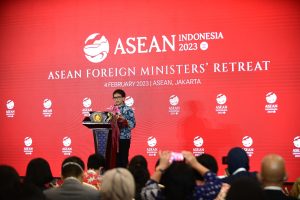Indonesia is increasing its efforts to implement its plan to end the conflict in Myanmar, ahead of chairing a string of important meetings on the issue this week, Foreign Minister Retno Marsudi said on Friday.
As BenarNews reported, the crisis in Myanmar will be high on the agenda at a series of ministerial-level meetings that Indonesia will host this week as the current chair of the Association of Southeast Asian Nations (ASEAN). The talks include the ASEAN Foreign Ministers’ Meeting and other related meetings including counterparts from the United States, China, and Russia.
During a press conference, Retno said that Indonesia had conducted 110 engagements “in the form of in-person meetings, virtual meetings, and phone calls” with various parties to Myanmar’s conflict to advance ASEAN’s Five-Point Consensus peace plan. These include senior officials from the military administration and the opposition National Unity Government (NUG), as well as various ethnic armed organizations and civil society groups.
“Engagements are not the goal but a means to getting to the goal of inclusive dialogue to achieve peace that is durable,” she said, according to The Straits Times.
“Without an inclusive dialogue, there will be no peaceful settlement accepted by all parties, and there will be no lasting peace in Myanmar,” Retno added. “Conflict can only be resolved if the parties have the passion and genuine commitment to create peace.”
That’s a very big “if.” In truth, nearly two-and-a-half years after the February 2021 coup, neither side has any desire for a negotiated settlement. Since the creation in April of that year of the Five-Point Consensus, which calls for an immediate cessation of violence and dialogue involving “all parties” to the country’s conflict, the Myanmar military has violated its goals at every turn. It has escalated its crackdowns on the NUG and its allies, which it refers to as “terrorists,” and refused to permit ASEAN’s special envoys, another creation of the Five-Point Consensus, from meeting with any members of the opposition. In short, it has strung ASEAN along to buy the time necessary to crush the anti-junta resistance.
At the same time, for many of those resisting the military regime, the struggle has evolved from a fight to reverse the coup to a fight to remove the military from Myanmar’s politics on a permanent basis. Tellingly, this camp also refers to its opponents, admittedly with more justification, as “terrorists.”
As a group of Myanmar civil society groups argued in a statement issued over the weekend, ASEAN’s adherence to the “ineffective” Five-Point Consensus, “will only embolden the terrorist junta to commit further crimes and exacerbate the plight of the people of Myanmar.”
In this air-tight opposition of aims, there appears to be little room for political negotiations, let alone a final compromise. “At this stage, it’s hard to imagine what a ‘negotiated, compromise deal’ would look like,” former U.S. ambassador to Myanmar Scot Marciel noted today on Twitter. “The military wants to hold onto power, and the people/resistance want it out of politics/power. The compromise ‘hybrid’ approach was tried and failed.”
If the Five-Point Consensus is not effective, then where does that leave ASEAN? It isn’t clear. The organization has neither the will nor probably the ability to strongarm the military government into submission, let alone throw its support behind the resistance. Either way, hostage to events inside the country, Indonesia is running out of time to prove that its form of “quiet diplomacy” is more effective than the approach of last year’s chair, Cambodia.

































